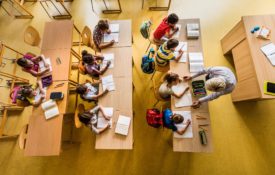-
Priming the Brain to Learn
The human brain is skilled at categorizing. People can quickly recognize a new variation of something they’ve seen before, like a dog, a chair, a jacket, or a lamp. We do this even when we’ve
-

Methods: How to Do Data Visualization Using R—Even If You Don’t Use R
Read about the advantages of using the programming language R in data processing and statistical analysis.
-

Student Notebook: The Outstanding Impacts of Supervisors on Student Success and Well-being
Samira Feizi discusses the importance of finding the right supervisor for doctoral students’ success and well-being.
-

Mix It Up: Testing Students on Unrelated Concepts Can Help Jump-Start Learning
Unlike traditional “blocked” testing, which requires students to retrieve information about a single topic, interleaved testing presents a mix of topics from various lessons in order to encourage deeper conceptual learning.
-

New Research in Psychological Science
A sample of research on how people view themselves and integrate others’ feedback, similarity reasoning in children, advice from top performers, science learning, working memory distortions, memory updating, motor coordination, and perceptions of authenticity.
-

New Research in Psychological Science
A sample of research on racial bias in police traffic stops, hypothesis testing, learning about the self, motivating growth by feeling discomfort, habits, stereotypes, and visual search.

